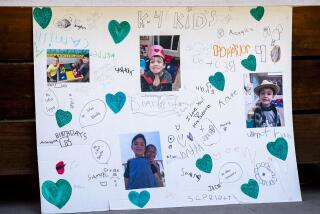On road trips, don’t leave etiquette by the roadside
- Share via
When Lizzie Post crammed into a Volkswagen Jetta last year for a three-day, cross-country road trip with a good friend and her cousin, plus a chinchilla named Bea and a cat named Denim, she knew far more was at stake than choosing the right fork or making proper introductions.
She had no doubt that road-trip etiquette could mean the difference between arriving at the destination still speaking to everyone or fantasizing about ditching a nettlesome passenger at the next rest stop.
It would be tough, she said, “if you were driving around as a vegan with a driver who considered himself king and stopped for burgers all the time.” Post is the great-great-granddaughter of etiquette expert Emily Post and author of “How Do You Work This Life Thing?” “The real attitude you should take is, ‘Let’s make it a good trip for everyone.’ The biggest problem would be the me-centric view.”
When you consider that 85% of all U.S. travelers will be going by car this summer, according to the American Automobile Assn., and you think about all the competing personalities, you have the recipe for a brouhaha or two.
“If you don’t discuss your driving habits, quirks, expectations and that sort of thing ahead of time, you will run into problems,” said Post, 24.
Among the issues to discuss: Will the day end at 3 p.m. at a resort or will you drive until 2 a.m. and slide into a cheap motel? Is this a drive-through, fast-food crowd or one that wants sit-down dinners at nice restaurants? And what, for heaven’s sake, is that racket coming from the car’s sound system?
Those sorts of issues, the road-trip pros say, are best worked out at a meeting before anyone puts pedal to metal (even if it’s all one family).
“It wouldn’t be very fair if the front seat wanted to stop at the Ritz and the back seat could barely afford a cheap motel,” says Colette Swan, owner of an etiquette school in Agoura Hills and the Manners From Heaven website, which offers free e-mail advice and, soon, etiquette podcasts and webcam tutorials.
She advocates meeting with everybody who’s going on the trip, including children, beforehand and putting — in writing — the decisions about expenses, routes, overnight stops, meals and sightseeing, even if it’s a family group.
“Everyone should get to have some say,” she said, “make some choices.”
Good choices, it’s hoped. Bad choices on a road trip include lengthy cellphone conversations, messy or smelly food and failing to share snacks or treats. Swan also suggests that everybody begin the trip bathed (but not wearing strong perfume or cologne) and wearing clean clothes. It may sound a bit touchy-feely, but it’s really all about caring and sharing. And that includes the driving. Sharing the driving is about manners, of course, but it’s also a safety issue, says Bill Van Tassel, national manager of driver training operations for AAA.
“Everyone who has a license ought to be willing to drive and share fuel costs,” Van Tassel said.
“You need to make sure you don’t have a single driver going too long. I know of families who have been killed because they wanted to drive through the night and no one stayed awake.” Groups on a road trip should switch drivers every 100 miles or two hours, he said. After that, as driver fatigue increases, so does risk.
At least two people should always be awake: the one who drives and the one who rides shotgun, navigating and serving as a second set of eyes.
Carolina Rosero, 24, a teacher in Guatemala, refined her system last year. After weekend road trips around Central America with coworkers, the group knew it would have to reach certain compromises.
As a group, they decided their top three sightseeing priorities. After they checked off those places, each traveler got one veto per trip.
“This means that when we decided to go see the millionth church or the 80th ruin, we could veto it if we felt grumpy, strongly opposed to it or just didn’t feel like doing it,” Rosero said.
“We could veto music we didn’t want to hear too.”
On most trips, Rosero said, everyone came to terms about sites, music, food and hotels, and everyone learned that things always went better if they discussed options beforehand.
But the first step on this long road, Swan reminds travelers, is to make sure you can, from the outset, travel safely with these people — and keep your sanity.
“If you’re the sort of person who likes to tell dirty jokes,” Swan says, “don’t travel with a car full of nuns.”
travel@latimes.com
More to Read
Sign up for The Wild
We’ll help you find the best places to hike, bike and run, as well as the perfect silent spots for meditation and yoga.
You may occasionally receive promotional content from the Los Angeles Times.






